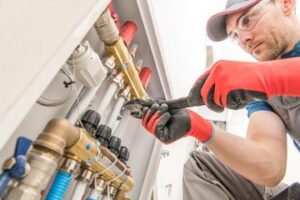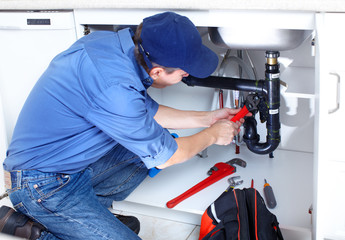How to Keep Your Plumbing System Running Smoothly
Plumbing is the network of pipes, fixtures, and appliances that carry water and sewage throughout your home. Like any system, it requires regular maintenance to ensure everything runs smoothly.
Plumbers install, repair, and maintain these systems. They read blueprints and building codes to determine how to route pipes, where to place valves, and what kind of fixtures can be installed. Contact Plumbing Express, Inc. for professional help.
Clogged pipes are not only a nuisance, but can be dangerous. For example, if a clog blocks an entire pipe or section of the line, wastewater isn’t able to exit your home and instead sits in the pipe until it overflows. This can cause severe water damage and even a potential health hazard as bacteria and microorganisms begin to grow. Clogged drain lines can also result in a loss of water pressure and may require immediate professional plumbing services.
Some clogs are confined to one fixture such as the bathtub drain or sink, and can be solved by using a plunger or drain cleaner. Other clogs are more serious and may require the use of a plumber snake or auger to break up the obstruction. If you notice that more than one fixture is draining slowly or not at all, it’s a good idea to contact a plumber right away as these types of clogs are often caused by larger problems such as broken pipes or sewer backups.
Food particles are a common culprit for clogged pipes, particularly in kitchens where cooking grease and fats can solidify and accumulate with other debris creating tough clogs. To avoid this problem, it is recommended to save cooking grease in an airtight jar or can and dispose of it properly in the trash rather than down a drain. Another simple preventative measure is to regularly pour baking soda and vinegar down a drain; this can help break down fats and oils before they have a chance to build up in your pipes.
Other causes of clogged pipes can include toys and other objects flushed down toilets by children; or natural phenomena such as heavy rainfall filling public sewer systems which then overflow into homes causing sewage to back up into drains. Maintaining regular inspections and replacing aging or damaged pipes can prevent these problems from occurring in the first place.
If you encounter any of the signs listed above it’s important to know when to call a plumber – further plunging, poking around or using chemicals could actually exacerabate the blockage. A plumber has the tools and experience to quickly and easily remove serious clogs without risking further damage to your pipes or plumbing fixtures.
Leaking Pipes
You rely on your home’s plumbing system to deliver fresh, clean water for cooking, drinking and cleaning. Unfortunately, over time, your pipes can develop leaks. If not addressed quickly, these minor inconveniences can become serious water damage issues that threaten your walls, floors and belongings.
While some leaks are easily repaired with a pipe clamp or plumber’s tape, it’s best to call a professional for major damage and repairs. A licensed plumber has the expertise to assess the extent of the damage, drain and repair the affected area to ensure a permanent solution.
Leaking pipes are usually caused by corrosion or worn components. As a result, the pipe wall or threads may rupture or disintegrate, and the joints can loosen and disconnect from the rest of the pipe. It’s important to inspect your plumbing regularly for signs of leaks, such as puddles and damp spots under sinks, in the basement or near appliances.
A leaking pipe can also lead to mold and mildew growth, which poses health risks for those with respiratory conditions or allergies. To prevent the spread of these potentially toxic substances, you should clean up any areas impacted by a leaky pipe as soon as possible and take precautions to protect your family from exposure.
If you notice a leaky pipe, your first step should be to shut off the water supply valve and drain the affected area. Then, you should use a torch to carefully examine dark areas under sinks and behind appliances for moisture. Once you’ve identified the location of a leak, you can use plumber’s epoxy to patch it. This quick-drying, waterproof sealant is available at most hardware stores. Before handling plumber’s epoxy, you should put on latex gloves to avoid chemical burns to your hands. Once you’ve wiped away any water accumulated on the surface, apply a small dab of epoxy to the damaged area and secure it with the adjustable pipe clamp.
A faulty plumbing fixture is a sure sign that it’s time for an upgrade. Whether you’re looking for a more efficient toilet, a sleeker showerhead or a new faucet, you can find the right fixtures to suit your style and budget at your local home improvement store.
Sewage Backups
When wastewater isn’t able to flow freely through the sewer system, it will often look for an alternative exit—like your drains and toilets. This is when a sewage backup can occur, and it’s no fun for anyone involved. This is a serious plumbing emergency that requires immediate attention from a professional plumber.
Sewage backups can cause major damage to your home and require costly repairs. This is because sewage contains dangerous and unhealthy contaminants such as bacteria, viruses, and fungi. Additionally, sewage can also lead to structural damage and leave behind unpleasant odors.
As a homeowner, you can take several steps to prevent sewage backups from happening in your home. These steps include reducing your waste production, performing regular maintenance on your pipes and appliances, and knowing when to call in the pros.
One of the most common causes of sewage backups is when homeowners flush items other than toilet paper down their drains. Items such as baby wipes and grease can clog your plumbing lines and cause a backup. To prevent this, make sure to only flush toilet paper and dispose of grease in a metal can or the trash.
Another common cause of sewage backups is when tree roots infiltrate the sewer line. This is because tree roots are looking for water and nutrients, and they can easily infiltrate the piping in your home. To prevent this, you can have your piping professionally inspected and consider having any older or damaged piping replaced.
A sewage backup can be expensive to repair, and it may also require you to replace your flooring, walls, and other valuables. It can also leave your home unusable until the issue is resolved. This can cause a disruption to your daily routine and can put a strain on your relationships with family and friends.
If you notice slow-draining sinks, gurgling noises coming from your drains, or toilets that won’t flush, it’s time to call in the professionals. These are all signs of a clogged drain or sewer line that needs to be addressed immediately. With these tips, you can avoid the headaches and financial burdens of a sewage backup.
Water Heater Repairs
Water heaters are vital for providing hot water for bathing, cooking, and cleaning. When they break down or become faulty, it can be a major inconvenience for homeowners and business owners alike. However, many common problems with water heaters can be repaired or avoided with regular maintenance and quick reaction to any issues that may arise.
Whether it’s whistling sounds, low rumbling noises, or a loud pop during heating cycles, noisy water heaters usually signal a problem with the pressure relief valve. This valve is responsible for releasing excess pressure in the tank, so when it malfunctions, the result can be excessive water flow or a loud popping sound during heating cycles. It’s important to maintain this crucial safety feature by removing sediment regularly and performing routine tests on the pressure relief valve.
Lukewarm or Cold Water
If your water heater is producing lukewarm or cold water, you might have a cross-connected hot and cold supply line. Turning off the water at the heater and opening a hot water tap should reveal if this is the case; if it does, you can easily fix the issue by switching the hot and cold supply lines over. If the lukewarm water persists, a broken heating element or thermostat could be to blame. A professional plumber should inspect and replace the appropriate component to restore full hot water functionality.
Discolored or Smelly Water
If you notice a foul smell coming from your water heater, it might be hydrogen sulfide gas that has leaked from the unit. This is a serious health hazard, and it could be caused by corrosion or bacteria in the water heater tank. A professional should disinfect the tank and drain ports, adjust the temperature setting, and test for hydrogen sulfide levels in order to restore safe, clean water. They will also check and replace the anode rod if necessary, as this sacrificial rod attracts corrosive elements away from the water heater tank to prevent damage.

